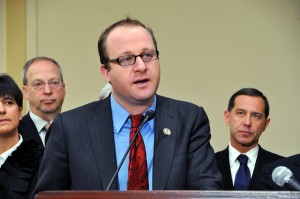National
House panel rejects LGBT protections in domestic violence bill
Measures offered by Polis, Nadler, Quigley voted down

A Republican-controlled House panel beat back measures on Tuesday that would have made LGBT protections part of legislation aiming to extend federal authorization for domestic violence programs.
The House Judiciary Committee voted down several measures that would have made the House version of the Violence Against Women Act reauthorization LGBT-inclusive.
One amendment that was offered by Rep. Jared Polis (D-Colo.) — voted down on a 14-18 vote — would have prohibited domestic violence programs receiving funds under VAWA from discriminating against someone based on actual or perceived sexual orientation or gender identity.
“The Violence Against Women Act needs to be an inclusive bill that covers all of today’s families, whether those families are composed of a man and a woman, or two women or two men, and that’s why I’m offering this amendment,” said Polis, who’s gay.
Polis continued, “It doesn’t say anything about a particular lifestyle that members of the committee may not agree personally agree with. It simply says the law needs to be applied equally.”
Prior to the vote on the amendment, anti-gay Rep. Steve King (R-Iowa) voiced opposition, saying other characteristics such as race and sex are immutable, but sexual orientation and gender identity are “self-professed” identifications.
“I also make the point that this is supposed to be the Violence Against Women Act,” King said. “Even though that is the case and that needs to be the subject of this discussion; we still are bringing up the subject of sexual orientation and gender identity when people no matter what their sexual orientation or gender identity are covered under this bill.”
King called for more data that LGBT non-discrimination protections are needed for domestic violence programs and said other vehicles would be more appropriate for dealing with this bias other than the Violence Against Women Act.
But Rep. Sheila Jackson-Lee (D-Texas) responded by saying the committee shouldn’t be “in the business of limiting” protections that would be afforded under the legislation.
Another amendment came from Rep. Jerrold Nadler (D-N.Y.) that would have explicitly included the LGBT community in VAWA’s “STOP Grant Program.” It was voted down along party lines by a 12-15 vote.
“With this addition, STOP grant recipients would be able to offer programs to target members of the LGBT community who are not otherwise being served,” Nadler said. “This would not be a requirement of any STOP grant recipient, but would allow entities to use STOP grants for this purpose if they so choose.”
The “STOP Grant Program” is the largest program funded under the law and provides funding to care providers who collaborate with prosecution and law enforcement officials to address domestic violence.
Yet another amendment from Rep. Mike Quigley (D-Ill.) would have explicitly included sexual orientation and gender identity as part of the underserved groups protected under VAWA. Like the others, the measure was voted down on a party-line basis, 13-16.
In his remarks introducing the amendment, Quigley criticized the House version of VAWA reauthorization for not going far enough to protect LGBT victims of domestic violence as well as other groups.
“Domestic violence affects people from all walks of life, whether they are gay, straight, immigrants or tribal members,” Quigley said. “Everyone deserves to be protected. Sadly the bill being considered by the committee today fails to meet the mark.”
Chairman Lamar Smith (R-Texas) voiced opposition in particular to the Quigley amendment, saying “there is little data” to support the need for “special protected status” for LGBT people.
“There’s nothing under current federal law to prevent LGBT victims of domestic violence from receiving federal resources and services,” Smith said.
The House version of VAWA aims to extend programs authorized under the existing law — first enacted in 1994 — to assist victims and survivors of domestic violence, dating violence, sexual assault and stalking. But civil rights groups have criticized the House version of the bill for not going far enough and failing to provide explicit protections for minorities, including LGBT people.
Data exists showing that LGBT people are victims of domestic violence and suffer from discrimination when seeking help at shelters. According to a 2010 report from the National Coalition of Anti-Violence Programs, 44.6 percent of LGBT domestic violence survivors were turned away by a shelter and 54.4 percent of LGBT survivors seeking an order of protection were denied help.
Ian Thompson, legislative representative for the American Civil Liberties Union, criticized Republicans for refusing to adopt the Polis amendment.
“LGBT victims of domestic violence often face significant discriminatory barriers when attempting to access services,” Thompson said. “The Polis amendment would have addressed this problem of LGBT exclusion by adding sexual orientation and gender identity to VAWA’s nondiscrimination provision. This is a matter of basic fairness and commonsense. It is unfortunate that a majority of the House Judiciary Committee disagreed.”
Harsh words also came from Joe Solmonese, president of the Human Rights Campaign.
“The Republican members of the House Judiciary Committee have failed victims of domestic violence,” Solmonese said. “Republicans on the committee ignored key priorities identified by nearly 2,000 service providers and victim advocates by moving forward with a bill that disregards many victims, including LGBT victims.”
After rejecting the pro-LGBT measures, the committee voted to report out the legislation by a vote of 17-15 — again on largely a party-line basis with Republicans voting to move their bill.
The language of House Democrats’ amendments are found in the Senate version of the bill, which was passed by that chamber April 26 on bipartisan vote of 68-31 along with LGBT-inclusive language. Because the Senate version of the legislation has LGBT language that isn’t found in the House version of the bill, the two chambers will have to come an agreement on the LGBT provisions in conference committee before the House and Senate vote on a final version of the bill.
Despite the failure of the committee to adopt the pro-LGBT amendments, Thompson expressed optimism that the LGBT language would survive the conference committee and the final round of voting based on the bipartisan support with which the Senate version of the bill passed.
“The reality is that the Senate’s version of VAWA reauthorization addresses a range of important civil liberties issues, including coverage for the LGBT community, and passed out of that chamber with the support of 68 senators, including significant Republican support,” Thompson said. “I believe there is majority support in Congress for a VAWA reauthorization that would ensure that domestic violence protections extend to all who suffer its harms.”
Other members on the House panel spoke out against the lack of LGBT protections in the House version of the bill, including Rep. John Conyers (D-Mich.), ranking Democrat on the panel, as well as Reps. Bobby Scott (D-Va.) and Sheila Jackson-Lee (D-Texas).
But the House Democrats’ measure weren’t the only pro-LGBT initiatives that Republicans rejected. Rep. John Conyers (D-Mich.), ranking Democrat on the committee, offered a substitute bill that was modeled on a version of VAWA introduced by Rep. Gwen Moore (D-Wis.) and other House Democrats. That legislation has the same LGBT protections found in the Senate version of the bill.
Chairman Lamar Smith (R-Texas) refused to allow Conyers’ substitute to come up after Rep. Jim Sensenbrenner (R-Wis.) objected to it on the basis that it was non-germane. In the House, amendments must be germane to the legislation at hand for them to come up for a vote.
The committee rejected the pro-LGBT initiatives after HRC and the ACLU wrote letters objecting to the lack of LGBT protections in the House version of the legislation.
In a letter dated May 7, Laura Murphy, director of the ACLU’s Washington Legislative Office, and Vania Leveille, senior legislative counsel, talked about the importance of the LGBT protections found in the Senate bill in addition to expressing other concerns.
“H.R. 4970 does nothing to address the unacceptable discrimination that LGBT people often face when attempting to access services for those who experience intimate-partner violence, and nothing to change the fact that the LGBT community is undeserved in this area,” Murphy and Leveille write.
NOTE: This post has been updated.
Michigan
Mich. Democrats spar over LGBTQ-inclusive hate crimes law
Lawmakers disagree on just what kind of statute to pass

Michigan could soon become the latest state to pass an LGBTQ-inclusive hate crime law, but the state’s Democratic lawmakers disagree on just what kind of law they should pass.
Currently, Michigan’s Ethnic Intimidation Act only offers limited protections to victims of crime motivated by their “race, color, religion, gender, or national origin.” Bills proposed by Democratic lawmakers expand the list to include “actual or perceived race, color, religion, gender, sexual orientation, gender identity or expression, ethnicity, physical or mental disability, age, national origin, or association or affiliation with any such individuals.”
Democratic Gov. Gretchen Whitmer and Attorney General Dana Nessel have both advocated for a hate crime law, but house and senate Democrats have each passed different hate crimes packages, and Nessel has blasted both as being too weak.
Under the house proposal that passed last year (House Bill 4474), a first offense would be punishable with a $2,000 fine, up to two years in prison, or both. Penalties double for a second offense, and if a gun or other dangerous weapons is involved, the maximum penalty is six years in prison and a fine of $7,500.
But that proposal stalled when it reached the senate, after far-right news outlets and Fox News reported misinformation that the bill only protected LGBTQ people and would make misgendering a trans person a crime. State Rep. Noah Arbit, the bill’s sponsor, was also made the subject of a recall effort, which ultimately failed.
Arbit submitted a new version of the bill (House Bill 5288) that added sections clarifying that misgendering a person, “intentionally or unintentionally” is not a hate crime, although the latest version (House Bill 5400) of the bill omits this language.
That bill has since stalled in a house committee, in part because the Democrats lost their house majority last November, when two Democratic representatives resigned after being elected mayors. The Democrats regained their house majority last night by winning two special elections.
Meanwhile, the senate passed a different package of hate crime bills sponsored by state Sen. Sylvia Santana (Senate Bill 600) in March that includes much lighter sentences, as well as a clause ensuring that misgendering a person is not a hate crime.
Under the senate bill, if the first offense is only a threat, it would be a misdemeanor punishable by one year in prison and up to $1,000 fine. A subsequent offense or first violent hate crime, including stalking, would be a felony that attracts double the punishment.
Multiple calls and emails from the Washington Blade to both Arbit and Santana requesting comment on the bills for this story went unanswered.
The attorney general’s office sent a statement to the Blade supporting stronger hate crime legislation.
“As a career prosecutor, [Nessel] has seen firsthand how the state’s weak Ethnic Intimidation Act (not updated since the late 1980’s) does not allow for meaningful law enforcement and court intervention before threats become violent and deadly, nor does it consider significant bases for bias. It is our hope that the legislature will pass robust, much-needed updates to this statute,” the statement says.
But Nessel, who has herself been the victim of racially motivated threats, has also blasted all of the bills presented by Democrats as not going far enough.
“Two years is nothing … Why not just give them a parking ticket?” Nessel told Bridge Michigan.
Nessel blames a bizarre alliance far-right and far-left forces that have doomed tougher laws.
“You have this confluence of forces on the far right … this insistence that the First Amendment protects this language, or that the Second Amendment protects the ability to possess firearms under almost any and all circumstances,” Nessel said. “But then you also have the far left that argues basically no one should go to jail or prison for any offense ever.”
The legislature did manage to pass an “institutional desecration” law last year that penalizes hate-motivated vandalism to churches, schools, museums, and community centers, and is LGBTQ-inclusive.
According to data from the U.S. Department of Justice, reported hate crime incidents have been skyrocketing, with attacks motivated by sexual orientation surging by 70 percent from 2020 to 2022, the last year for which data is available.
Twenty-two states, D.C., Puerto Rico, and the U.S. Virgin Islands have passed LGBTQ-inclusive hate crime laws. Another 11 states have hate crime laws that include protections for “sexual orientation” but not “gender identity.”
Michigan Democrats have advanced several key LGBTQ rights priorities since they took unified control of the legislature in 2023. A long-stalled comprehensive anti-discrimination law was passed last year, as did a conversion therapy ban. Last month the legislature updated family law to make surrogacy easier for all couples, including same-sex couples.
A bill to ban the “gay panic” defense has passed the state house and was due for a Senate committee hearing on Wednesday.
Indiana
Drag queen announces run for mayor of Ind. city
Branden Blaettne seeking Fort Wayne’s top office

In a Facebook post Tuesday, a local drag personality announced he was running for the office of mayor once held by the late Fort Wayne Mayor Tom Henry, who died last month just a few months into his fifth term.
Henry was recently diagnosed with late-stage stomach cancer and experienced an emergency that landed him in hospice care. He died shortly after.
WPTA, a local television station, reported that Fort Wayne resident Branden Blaettne, whose drag name is Della Licious, confirmed he filed paperwork to be one of the candidates seeking to finish out the fifth term of the late mayor.
Blaettner, who is a community organizer, told WPTA he doesn’t want to “get Fort Wayne back on track,” but rather keep the momentum started by Henry going while giving a platform to the disenfranchised groups in the community. Blaettner said he doesn’t think his local fame as a drag queen will hold him back.
“It’s easy to have a platform when you wear platform heels,” Blaettner told WPTA. “The status quo has left a lot of people out in the cold — both figuratively and literally,” Blaettner added.

The Indiana Capital Chronicle reported that state Rep. Phil GiaQuinta, who has led the Indiana House Democratic caucus since 2018, has added his name to a growing list of Fort Wayne politicos who want to be the city’s next mayor. A caucus of precinct committee persons will choose the new mayor.
According to the Fort Wayne Journal Gazette, the deadline for residents to file candidacy was 10:30 a.m. on Wednesday. A town hall with the candidates is scheduled for 6 p.m. on Thursday at Franklin School Park. The caucus is set for 10:30 a.m. on April 20 at the Lincoln Financial Event Center at Parkview Field.
At least six candidates so far have announced they will run in the caucus. They include Branden Blaettne, GiaQuinta, City Councilwoman Michelle Chambers, City Councilwoman Sharon Tucker, former city- and county-council candidate Palermo Galindo, and 2023 Democratic primary mayoral candidate Jorge Fernandez.
Arizona
Ariz. governor vetoes anti-transgender, Ten Commandments bill
Katie Hobbs has pledged to reject anti-LGBTQ bills that reach her desk

BY CAITLIN SIEVERS | A slew of Republican bills, including those that would have allowed discrimination against transgender people and would have given public school teachers a green light to post the Ten Commandments in their classrooms, were vetoed by Gov. Katie Hobbs on Tuesday.
Hobbs, who has made it clear that she’ll use her veto power on any bills that don’t have bipartisan support — and especially ones that discriminate against the LGBTQ community — vetoed 13 bills, bringing her count for this year to 42.
Republicans responded with obvious outrage to Hobbs’s veto of their “Arizona Women’s Bill of Rights,” which would have eliminated any mention of gender in state law, replacing it with a strict and inflexible definition of biological sex. The bill would have called for the separation of sports teams, locker rooms, bathrooms, and even domestic violence shelters and sexual assault crisis centers by biological sex, not gender identity, green-lighting discrimination against trans Arizonans.
“As I have said time and again, I will not sign legislation that attacks Arizonans,” Hobbs wrote in a brief letter explaining why she vetoed Senate Bill 1628.
The Arizona Senate Republicans’ response to the veto was filled with discriminatory language about trans people and accused them of merely pretending to be a gender different than they were assigned at birth.
“With the radical Left attempting to force upon society the notion that science doesn’t matter, and biological males can be considered females if they ‘feel’ like they are, Katie Hobbs and Democrats at the Arizona State Legislature are showing their irresponsible disregard for the safety and well-being of women and girls in our state by killing the Arizona Women’s Bill of Rights,” Senate Republicans wrote in a statement.
The Senate Republicans went on to accuse the Democrats who voted against the bill of endangering women.
“Instead of helping these confused boys and men, Democrats are only fueling the dysfunction by pretending biological sex doesn’t matter,” Senate President Warren Petersen said in the statement. “Our daughters, granddaughters, nieces, and neighbors are growing up in a dangerous time where they are living with an increased risk of being victimized in public bathrooms, showers, and locker rooms because Democrats are now welcoming biological males into what used to be traditionally safe, single-sex spaces.”
But trans advocates say, and at least one study has found, that there’s no evidence allowing trans people to use the bathroom that aligns with their identity makes those spaces less safe for everyone else who uses them.
In the statement, the bill’s sponsor, Sen. Sine Kerr (R-Buckeye), claimed that the bill would have stopped trans girls from competing in girls sports, something she said gives them an unfair advantage. But Republicans already passed a law to do just that in 2022, when Republican Gov. Doug Ducey was still in office, though that law is not currently being enforced amidst a court challenge filed by two trans athletes.
Republicans also clapped back at Hobbs’ veto of Senate Bill 1151, which would have allowed teachers or administrators to teach or post the Ten Commandments in public school classrooms, a measure that some Republicans even questioned as possibly unconstitutional.
In a statement, the bill’s sponsor, Sen. Anthony Kern (R-Glendale), accused Hobbs of “abandoning God” with her veto.
“As society increasingly strays away from God and the moral principles our nation was founded upon, Katie Hobbs is contributing to the cultural degradation within Arizona by vetoing legislation today that would have allowed public schools to include the Ten Commandments in classrooms,” Kern said in the statement.
In her veto letter, Hobbs said she questioned the constitutionality of the bill, and also called it unnecessary. During discussion of the bill in March, several critics pointed out that posting the Ten Commandments in public school classrooms, tenets of Judeo-Christian religions, might make children whose families practice other religions feel uncomfortable.
“Sadly, Katie Hobbs’ veto is a prime example of Democrats’ efforts to push state-sponsored atheism while robbing Arizona’s children of the opportunity to flourish with a healthy moral compass,” Kern said.
Another Republican proposal on Hobbs’s veto list was Senate Bill 1097, which would have made school board candidates declare a party affiliation. School board races in Arizona are currently nonpartisan.
“This bill will further the politicization and polarization of Arizona’s school district governing boards whose focus should remain on making the best decisions for students,” Hobbs wrote in her veto letter. “Partisan politics do not belong in Arizona’s schools.”
******************************************************************************************

Caitlin joined the Arizona Mirror in 2022 with almost 10 years of experience as a reporter and editor, holding local government leaders accountable from newsrooms across the West and Midwest. She’s won statewide awards in Nebraska, Indiana and Wisconsin for reporting, photography and commentary.
******************************************************************************************
The preceding piece was previously published by the Arizona Mirror and is republished with permission.
Amplifying the voices of Arizonans whose stories are unheard; shining a light on the relationships between people, power and policy; and holding public officials to account.
Arizona Mirror is part of States Newsroom, the nation’s largest state-focused nonprofit news organization.
-

 Africa4 days ago
Africa4 days agoCongolese lawmaker introduces anti-homosexuality bill
-

 District of Columbia24 hours ago
District of Columbia24 hours agoReenactment of first gay rights picket at White House draws interest of tourists
-

 World4 days ago
World4 days agoOut in the World: LGBTQ news from Europe and Asia
-

 Arizona1 day ago
Arizona1 day agoAriz. governor vetoes anti-transgender, Ten Commandments bill














